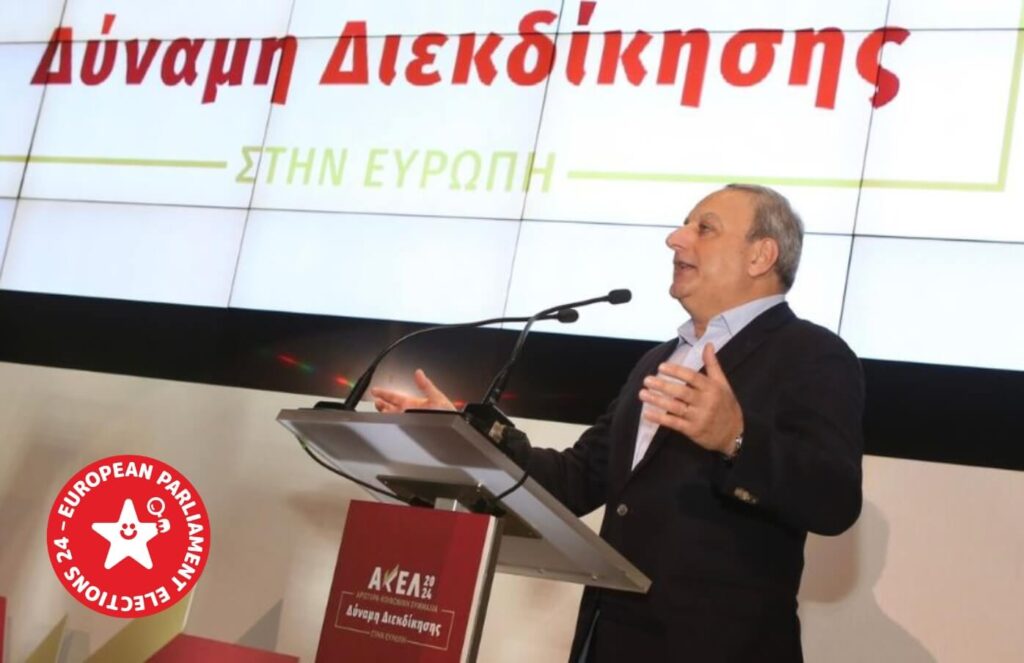
As Cyprus gears up for the European Parliament (EP) elections, it’s crucial to analyse the current political dynamics within the country. This article provides an overview of the balance of political forces, projections for the EP elections and key issues for political parties in Cyprus.
The elections on June 9th will be particularly significant for Cyprus. These elections will mark the first time that Cyprus holds European and municipal elections simultaneously, following a reform passed by the Parliament in 2022. In order to have a comprehensive understanding of the current state of power dynamics, it is imperative to examine closely the aftermath of the February 2023 presidential elections, one year after Nikos Christodoulides took over the presidency of the state, but also to consider the recent reforms on municipal elections and the complexity that this creates for the parties and the voters.
Nikos Christodoulides (a key figure in Nicos Anastasiades’ decade-long administration and his party Democratic Rally [DISY]) was supported in the elections by parties who would self-identify as being in the poltical centre (DIKO, EDEK, DIPA) as well as (not openly, but noticeably) by the far-right party ELAM. He had managed to portray himself as a reformist candidate from outside the political establishment who would give voice to the common citizen, away from the old-fashioned party clientele practices. However, disillusionment came quickly, and his true colours began to show: with dozens of moves of nepotism and irresponsible and dangerous political decisions which left the government and the president exposed to the extent that he “earned the title” of the president with the least popular support within a year of governance.
The internal conflict within the right-wing DISY party, due to the stance of former President of Cyprus N. Anastasiades and other key players in undermining the official candidate A. Neophytou, and the subsequent failure of DISY to elect their candidate, led Neophytou to resign from the presidency of DISY. What followed was the election of Annita Demetriou to party leader and to President of the Parliament, despite her being completely unknown to the political scene until few years ago and, by admission, with no exceptional political skills to rule a party like DISY. This has given – and continues to give – room for various factions within the party to determine their own agenda, especially with local elections, that are largely motivated by self-interest against party discipline. Therefore, the division that is now observed, through polls and with the defection of important members from DISY and their integration into other political formations (the most notable such instance was the move of a member of the political bureau of DISY to the right wing ELAM) or their participation in elections as independents, will undoubtedly also affect the electoral percentages of the European elections, thus challenging the hegemony of DISY by AKEL for the first time since 2004 when Cyprus joined the European Union.
In the last EP elections DISY obtained 29% (81500 votes) and two out of six seats allocated to Cyprus in the European Parliament, participating in European People’s Party (EPP) group. Current polling shows the party will receive between 20-22%.
AKEL, the party of the left, member of The Left group in the EP and observer party of the Party of the European Left, appears keen and hopeful, in a position to come first in the elections. This success could serve as a catalyst for shifting the balance of power in the next parliamentary elections and potentially influencing the outcome of the presidential elections in 2028.
To have a grasp of this dynamic, we must evaluate the following factors:
- The new leadership of the party, since the congress in June 2021, has made significant organisational changes, especially after the constitutional congress in November 2023. It has sent a message to wider sections of Cypriot society, beyond the traditional left, that they can join forces with AKEL on common goals of equality, good governance, democratic principles, ecology, human rights, but above all, to claim any hope for the reunification of Cyprus. The creation of the electoral coalition under the title AKEL Left – Social Alliance, which hosts personalities beyond AKEL’s traditional sphere, opens the possibility of expanding the outreach of the party and its electoral share.
- At the same time, the positive impact from the election campaign of Andreas Mavroyiannis (presidential candidate supported by AKEL in 2023) in combination with the increasingly distinctly negative image of President Christodoulides and his government, shows the sincerity and seriousness of AKEL to a part of Cypriot society that had previously been hesitant to align with the party.
According to the most recent polls, AKEL is in first place with DISY with a 22% share. In the previous European elections AKEL received 27.5% (77000 votes) and in the 2021 parliamentary elections 22.3% (80000 votes). These figures, given the predicted increase in turnout due to the simultaneous municipal elections and the tendency of the polls to generally predict AKEL’s vote share much lower than the final results, as well as other qualitative characteristics of AKEL‘s ballot and the turbulence in AKEL‘s main electoral rival, are all favourable conditions which point to its emergence as the leading party. This could lead to securing participation with two MEPs and pave the way for significant changes in domestic politics.
ELAM is the far-right wing party of Cyprus, formed as a branch of Greece’s Golden Dawn. Its trajectory in recent years has been consistently upward, paralleling other far-right parties in Europe. The right in Cyprus, as well as in Europe, has blurred the boundaries and differences with the far-right. They cooperate, negotiate, and even co-govern. In Cyprus, things are even clearer. Both Presidents Anastasiades and Christodoulides as well as DISY’s current president and the president of the Parliament, Annita Demetriou, owe their election to ELAM. What’s more, ELAM endorsed DISY with votes on several occasions in the parliament to pass state budgets and other legislation. Their confrontation is not about the substance of political positions but a fight for the votes of the far-right. All these reinforce the far right but, at the same time, reveal its deep systemic character. The polls show ELAM up to 11%, a more than 4% increase since the parliamentary elections in 2021, this would mean achieving third place and one MEP.
ELAM, like many other far-right parties in Europe, leverages populism to appeal to parts of society suffering from austerity policies, using racist rhetoric without proposing solutions but rather seeking to rally the masses. They attempt to popularise to the masses while simultaneously trying to conceal their fascist orientation. The inclusion of political personalities such as the former government spokesperson (ex-member of the Political Bureau of DISY) and the financial commissioner on the ballot for the EP elections, as well as statements from the president of ELAM that they can take on the role of ‘regulator’ in the government, clearly suggest a shift of ELAM strategy aimed at capturing a larger portion of the electoral pool. Additionally, in the event of its election, ELAM will join the ECR group. In fact, on March 30th, 2024, a conference was held with the ECR in Cyprus, initiated by ELAM and with the participation of delegations from 22 countries.
The parties of the so-called centre, which are part of the government alliance, are experiencing a significant decrease in their share of the electorate. This is a result of both the poor image of the government, of which they are an essential part, and the image that the parties themselves project to a part of Cypriot society, as representatives of an opportunistic political outlook without clear political positions and ideology, which often shifts based on the circumstance of accession to or retention of power.
The Democratic Party (DIKO) and the Socialist Party (EDEK) each won one seat in the previous EP elections. DIKO received a percentage of 13.8 and EDEK 10.6%. Both parties are part of Progressive Alliance of Socialists and Democrats (S&D) group. Polling projections for DIKO show it will receive around 10% and will most likely secure one MEP, but with significant losses, especially if the far-right ELAM manages to overtake DIKO for third place.
A feature of EDEK’s campaign 5 years ago was its appeal to voters to avert the election of ELAM, which it succeeded doing, since ELAM got 8.2%. Five years later the party is attempting to repeat this narrative strategy, but this time it does not seem to be effective. Polls show EDEK getting no more than 3%, as the party has completely lost its ideological and political identity, adopting extreme positions on the Cyprus Issue and intolerant positions about immigrants, leaving little room for distinction between them and the far right. The MEP of EDEK, few months after his election, distanced his position from the party due to internal conflicts, resulting in his expulsion. Since then, he has pursued an independent political path.
Democratic Alignment (DIPA), a party which made their first appearance in the EP elections of 2019 (3.8%), after its foundation as a split from DIKO, is expected to receive around 2%, with no hope of ensuring a seat in the EP. However, in the event they gained a seat they would join the Renew Europe group.
The Greens, who are not part of the current government also seem to face electoral problems as the stance they took in the presidential elections did not help the party to have a clear line against the candidacy of Christodoulides, which was perceived to continue the problematic policy of the Anastasiades government. The electoral pool that the Green Party wishes to address considers the matters of corruption elimination and good governance high political priorities. One of the three green members of the parliament left the party to form Volt Cyprus along with other public figures that advocate for peace and reunification of Cyprus. Internal rifts and the failure to have a clear stance on a presidential candidate led the president of the movement to resign, as well as a shift of the party further to the right, especially concerning the Cyprus Issue. They are affiliated with the European Greens but seem unlikely to secure an MEP with only 2% support according to the polls, lower than the 3.3% they received in the 2019 elections.
The newest addition in the electoral map of Cyprus, Volt Cyprus, is not getting more than 2-3% in the polls, a percentage that certainly does not allow it to compete for a position in the European Parliament. However, it will maintain its presence in the political life of Cyprus until the parliamentary elections of 2026, where its main goal is to secure a seat in the Cypriot parliament if it surpasses the threshold of 3.6%. Volt is considered a pro-European party with a progressive orientation, yet their positions lack radicalism, posing no significant threat to the main left-wing party, AKEL.
An additional highlight of this year’s European elections is the participation of three Turkish Cypriots as candidates, each affiliated with different Greek Cypriot political parties. AKEL and Niyazi Kiziliyurek aim to repeat the success of 2019, when a Turkish Cypriot was elected in the EP for the first time. Moreover, the Greens and Volt have included a Turkish Cypriot on their ballot, seeking to attract a portion of the Turkish Cypriot voters, who are projected in upward numbers since the last election and could significantly influence the outcome.
Very few public debates focus on European issues; instead, the spotlight is on migration policies and the challenges Cyprus faces as a country situated near conflict zones in the Middle East. The increasing numbers of refugees arriving from Syria amplify these discussions.
Additionally, the parallel elections for city councils extend the focus to other topics and reduce public debate time on European related issues. For local government elections, voters will receive 5 separate ballots. Across all towns and municipalities, over 3000 seats must be filled. Assuming at least 6 parties will have candidates for all the positions, we can safely estimate that there will be more than 20 thousand candidates in a 547,000-strong electorate, comprising 3.6% of voters provided that the entire electorate body votes [realistically, voters will not exceed 55%].
This could have some positive consequences, such as increased participation (the voter turnout in the municipal elections in 2016 was 55%, compared to the 45% turnout in the 2019 EP elections). However, the complexity of the elections will inevitably create many challenges, primarily stemming from the logistical complexity of the ballot system (to vote each voter will be given at least six ballots), the electoral process risks being fraught with confusion and inefficiency. Furthermore, the amalgamation of electoral events raises questions about the allocation of party financial and organisational resources.
As Cyprus prepares for the EP elections, understanding the country’s political landscape is essential for grasping the broader implications of the electoral process. The political discourse leading up to the elections is primarily shaped by internal party dynamics rather than by a focus on European issues. However, as the election date draws nearer, we can anticipate some discussions emerging on European matters as well.
Cover-Photo: General Secretary of AKEL, Stefanos Stefanou at the presentation of AKEL Left – Social Alliance candidates for the 2024 European elections in the Nicosia district. Source: AKEL.



